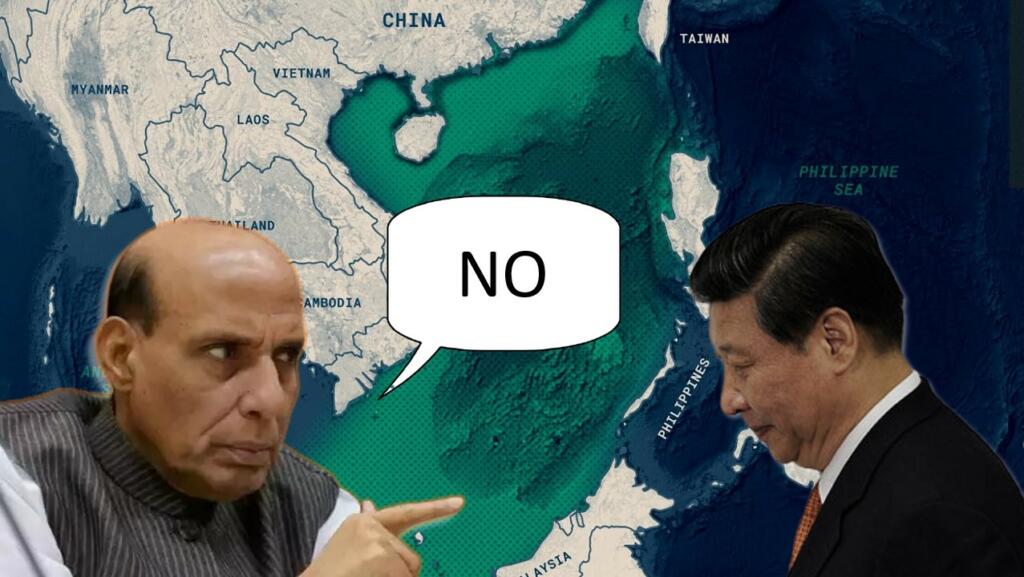After almost two years of thrashing China’s hegemonic attempts at the regional level, India is now gearing up for supranational diplomatic war with China. Defence Minister Rajnath Singh’s bold response to China not upholding The United Nations Convention on the Law of the Sea (UNCLOS) in the South China Sea is a clear indication of India’s rising stature vis-à-vis China on the international stage.
Rajnath Singh takes on China:
In his trademark, no-harm diplomatic style of criticism, Defence Minister Rajnath Singh did not hold back in criticising China for its trespassing in the South China Sea.
On Sunday, 21st October, Shri Rajnath Singh was at the naval dockyard in Mumbai. He was the chief guest of the ceremony in which, indigenously built stealth-guided missile destroyer INS Vishakhapatnam was commissioned and handed over to the Indian Navy. Along with Shri Rajnath Singh, top Naval commanders were also present on the occasion.
Speaking to the nation, Rajnath Singh appreciated Indian Navy for its success in keeping the water boundaries safe. Taking a dig at China’s varying interpretation of UNCLOS, he asked China to follow the spirit behind the formation of UNCLOS. Indirectly accusing China of hegemonic tendencies, the defence minister said, “the ‘United Nations Convention on the Law of the Sea’ (UNCLOS) of 1982, territorial waters of nations, exclusive economic zones and the principle of ‘Good order at sea’ have been propounded. Some irresponsible nations, for the sake of their narrow partisan interests, keep on giving new and inappropriate interpretations to these international laws from hegemonic tendencies”
China creates confusion and panic in the region:
Shri Singh opined that arbitrary and solipsistic interpretations create confusion and uncertainty in the region. He also elaborated on India’s vision of protecting the interests of the countries in the region. Reaffirming that India believes in freedom of navigation for everyone, Shri Rajnath Singh said, “The arbitrary interpretations create obstacles in the path of a rule-based maritime order. We envision a rule-based Indo-Pacific, with freedom of navigation, free trade, and universal values, in which the interests of all the participating countries are protected. As a responsible maritime stakeholder, India supports consensus-based principles and a peaceful, open, rules-based stable maritime order”
The defence minister went on to outline the Indian Navy’s role in piracy, terrorism, illegal smuggling of arms and narcotics, human trafficking, illegal fishing, and damage to the environment. Comparing India’s capacity with other countries heavily engaged in modernizing their armed forces, the defence minister emphasised on Indianizing India’s military capacity. He especially pointed towards the role of the Aatmanirbhar Bharat campaign in this direction.
Xi Jinping’s Neo-Colonialism:
As reported by TFI, ever Since Xi Jinping came to power in March 2013, China has exponentially increased its efforts to colonise countries like the Philippines, Vietnam, Indonesia, and Malaysia. Since, in today’s world order, it’s almost impossible to militaristically conquer a country’s sovereign territory, the communist nation tries to take advantage of the vagueness caused due to technical inefficiency in drawing the sea boundaries for a particular state. The attempts to thwart the letter and spirit of UNCLOS by China has invited criticism from all over the world and has almost isolated the communist nation in the democratic world order.
India’s strict message to China:
Confused that India and its minnow neighbour Pakistan are the same, China tried to impose itself on India through military, economic, and strategic diplomacy. However, all efforts failed when China decided to engage in direct confrontation with India in the Galwan valley. After defeating China in the border clash, India unleashed not just military, but its economic and strategic war on the neo-colonist Xi Jinping’s China.
Read more: First Galwan, now Pangong Tso – China is a major coward when it comes to continuing a real fight
China must realize that the Indian political set up under PM Modi is not like that of the 1962 war. Now, the country is self-dependent in almost everything which is needed for its population, and any attempt to destabilize the nation will be met with well-deserved countermeasures.
